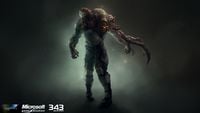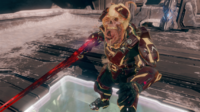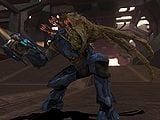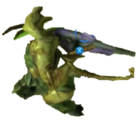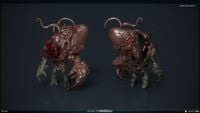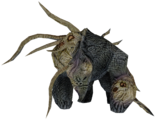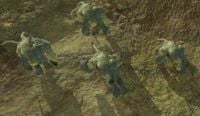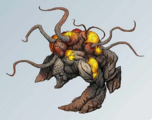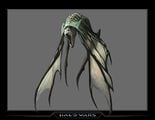Flood combat form: Difference between revisions
From Halopedia, the Halo wiki
| (892 intermediate revisions by more than 100 users not shown) | |||
| Line 1: | Line 1: | ||
{{ | {{Status|Canon}} | ||
{{ | {{Disambig header|the general term|the specific Flood form commonly referred to as a combat form|Flood attacker form}} | ||
{{Flood | {{Flood infobox | ||
|name=Combat | |name=Combat form | ||
|image=[[ | |image=[[File:H Evol - Mona Lisa Flood Combat Forms.png|350px]]<br>Several variations of combat form | ||
|height= | |height=Varies depending on type and host species.{{Ref/Reuse|Enc22P408}}{{Ref/Reuse|Enc22P409}} | ||
|distinctions= | |||
|attacks=Lunging at enemies with claws and whip-like tendrils, biting, and/or firing infectious barbs.{{Ref/Reuse|Enc22P408}}{{Ref/Reuse|Enc22P409}} | |||
|notable= | |||
| | *[[Flood attacker form|Attacker form]] | ||
*[[Flood thrasher form|Thrasher form]] | |||
*[[Flood swarm|Swarm form]] | |||
|attacks=Lunging at | |notable-title=Notable types | ||
|notable=*[[ | |||
*[[ | |||
*[[ | |||
}} | }} | ||
The '''Flood combat form''' is the primary form used by the [[Flood]] to overwhelm and decimate surviving populations, and one of the most common forms found in [[Feral Stage|early stages]] of a Flood outbreak. Combat forms can be created using either sapient or non-sapient hosts infected via means of the [[Flood Super Cell]], typically by a [[pod infector]]. They serve as the Flood's primary combatants, defending the Flood against attack and securing additional hosts for infection. The most common variation of combat form is the [[Flood attacker form|attacker form]].{{Ref/Book|Id=Enc22P408|Enc22|Page=408}} | |||
==Pathology== | ==Pathology== | ||
[[ | ===Infection and creation=== | ||
Combat forms are typically created when a [[pod infector]] is successfully able to enter a host's body, though this is not the only vector by which hosts can be infected.{{Ref/Site|Id=Universe|D=01|M=6|Y=2020|URL=https://www.halowaypoint.com/en-us/universe/species/flood|Site=Halo Waypoint|Page=Flood}} Flood outbreaks can often be caused by [[Flood spore|spores]] or other microbiological vectors entering the host body,{{Ref/Reuse|Universe}} or by contact with other forms that include Flood [[Seeder infector|Seeder]]s or [[Flood infester form|Infester]]s.{{Ref/Game|Id=ATN|HW2|Detail=[[Halo Wars 2: Awakening the Nightmare|Awakening the Nightmare]]}} In more advanced stages of infection, the need for specific [[infection form]]s is decreased as the Flood-infected area converts to a [[Blightlands|Blightland]] or [[Flood hive]]. By this point, the Flood presence makes up the majority of the terrain in the area, making contact with the Flood Super Cell and the naturally-generated spores an inevitability. Some Flood structures such as the "[[Flood launcher|launcher]]" specialize in firing clouds of spores at uninfected forces, causing them to succumb to the infection without any kind of infection form involved.{{Ref/Game|HW|Flood Launcher in-game unit}} | |||
As Flood forms, including the combat form, naturally produce the Flood Super Cell (FSC), even being in contact with one can result in infection for an unprotected potential host. Given the combat forms' preference for melee combat, this makes even non-fatal strikes a death sentence, though such infections may progress slowly.{{Ref/Anthology|Id=MonaLisa|Evo|[[The Mona Lisa]]}} However, infection by spore inhalation or infection form is extremely quick, with a host succumbing often in as little as a few seconds. | |||
When conventionally infected by a pod infector, the infector latches onto the host and dig into the host's flesh with a razor-sharp barb-like appendage, injecting the FSC and proceeding to burrow themselves within the host. Typically, the pod infector makes its home within the chest cavity of the host life form, though depending on circumstance this is not always the case. Depending on the host in question, the pod infector will dislodge the host's bones and organs to make room for itself, resulting in extreme disfiguration such as dislocating the host's jaw{{Ref/Game|Id=H2AMP|H2A|[[Infection]] game mode}} or, in the case of infected [[Sangheili]], completely snapping the neck. This process can be performed on living or recently-deceased hosts, though often results in the "death" of a living host prior to their re-animation once the FSC takes hold.{{Ref/Reuse|Universe}} Some hosts may be attacked and infected by multiple pod infectors.{{Ref/Reuse|Flood10}} Even if the infection form is removed, the injection of FSC into the generated wounds results in those wounds becoming spore-filled blisters, and the host cannot be saved from infection.{{Ref/Game|Id=PLInfectionForm|HW2|Phoenix Logs|Detail=Infection Forms}} | |||
Once infected, the super cell begins to consume and convert sections of the host body, creating growths and new appendages of new super cell. As this process occurs, bodies take on the appearance and smell of decay.{{Ref/Novel|Id=Flood10|TF|Chapter=10}} With sapient hosts, some limbs and sensory organs are preserved in the transformation, and are used to operate tools, equipment, weapons, vehicles, and even ships.{{Ref/Reuse|Enc22P408}} Infection forms will often augment a host's body to better serve as a living weapon, and damage taken during fighting and infection can be repaired by the controlling infection form, though the combat form is ultimately disposable.{{Ref/Game|Id=PLCombatForm|HW2|Phoenix Logs|Detail=Combat Forms}}{{Ref/Reuse|Enc22P408}} Any damage that the combat form receives ultimately creates more vectors of infection as the chunks of infected flesh it leaves behind are scattered throughout the environment.{{Ref/Reuse|Enc22P408}} The Flood Super Cell is able to arrange itself to mimic any organ needed to keep the host working,{{Ref/Game|Id=Bestiarum|H3|[[Bestiarum]]}} while other internal organs are replaced with accretions that function as support lattices containing a sickly green liquid full of spores in suspension. Spore-filled polyps also often cover the exterior of combat forms.{{Ref/Reuse|Enc22P408}} Even once the FSC has taken control of the victim, the controlling infection form can often be seen buried within the victim, with the infection form's red sensory appendages poking out of the flesh. Until the body is completely subsumed by super cell growth, these appendages are maintained as an impromptu central nervous system.{{Ref/Reuse|Universe}}{{Ref/Reuse|Enc22P408}} Some combat form super cell growths take on a more chitinous nature, akin to armor plating, helping protect the combat form from enemy attacks.{{Ref/Game|Id=H4|H4|[[Flood (gametype)|Flood]] gametype}} | |||
With sapient hosts, the victim may still attempt to cry out from what remains of its mouth and throat even while being controlled, though it is also possible for the infection form to do so using the host's thoughts and memories as a psychological weapon.{{Ref/Game|Id=PLInfected|HW2|Phoenix Logs|Detail=Infected}} In extremely rare circumstances, a victim may remain fully aware of their present status, unable to do much but watch as their body is controlled by an outside force.{{Ref/Reuse|PLCombatForm}}{{Ref/Reuse|Enc22P408}} | |||
===Capabilities=== | |||
The infection form controlling a host body does not feel pain or fear, though the host is able to feel the physical effect of attacks rendered upon it.{{Ref/Reuse|PLCombatForm}} In extreme cases, the infection form will resort to self-mutilation of the host body if it needs to, such as breaking its own arms to use the snapped bone as an improvised weapon. However, the pain inflicted on the host body may also weaken the controlling infection form, provided that it was old and weak prior to infecting the host.{{Ref/Reuse|Flood10}} Combat forms are reliant on their infection form for all bodily and motor functions, and shooting the infection form will "kill" the combat form, though the body can be re-reanimated if another infection form is able to reach it. As a result, a combat form can be resurrected as many times as is needed, provided the body is still intact enough to be a viable host. To properly kill a combat form, it must be dismembered or disfigured to the point at which it is no longer a suitable host body for an infection form.{{Ref/Reuse|H3Gameplay}} | |||
When a sapient host is infected and made into an [[Flood attacker form|attacker form]], the infection form is able to absorb all of the host's knowledge and memories. As a result, attacker forms are capable of operating firearms, driving vehicles, operating tools and even starships.{{Ref/Reuse|PLCombatForm}} In the case of the ''[[Infinite Succor]]''{{'}}s [[Skirmish on Infinite Succor|infection]], infected warriors were able to set up patrols of the ship's corridors to guard the [[Proto-Gravemind]] growing in the ship.{{Ref/Comic|Id=Succor|HGN|Detail=[[The Last Voyage of the Infinite Succor]]}} The Flood's possession of an individual's body allows it to speak with the host's tongue.{{Ref/Reuse|PLCombatForm}}{{Ref/Reuse|Succor}}{{Ref/Level|H3|The Covenant (level)|The Covenant}} This memory-absorption extends critical knowledge such as command codes or colony locations. As such, when critical personnel are infected, they are contributed to the construction of a [[Gravemind]].{{Ref/Level|Id=Keyes|HCE|Keyes}} | |||
Attacker combat forms use their whip or scythe-like growths to attack their opponents in melee combat, and are capable of performing feats that their hosts previously could not, such as leaping large distances to cover ground. Even if a melee strike is not fatal, the imparted Flood Super Cell is enough to ensure the target's infection and death.{{Ref/Reuse|MonaLisa}} As the infection forms do not feel pain, combat forms are undeterred by enemy attacks and will not stop until they are destroyed, or their enemy is killed. Ballistic weapons are notably less effective against some combat forms because of this, with [[SRS99C-S2 AM sniper rifle]] rounds passing through combat forms with virtually no effect.{{Ref/Game|HCE|Gameplay}} Targeted shots against the limbs and embedded infection form are effective ways of dispatching combat forms.{{Ref/Book|OSFM|Page=172-175}} | |||
===Role within the Flood=== | |||
Combat forms make up the majority of the Flood's combatant forces, particularly in the [[Feral Stage]] of the parasite's development in which it has yet to acquire enough raw biomass for the creation of a [[Gravemind]] or [[Flood pure form|pure forms]]. During this stage, combat forms are not centrally controlled, and will begin to gather bodies for conversion into more Flood forms.{{Ref/Reuse|Keyes}} If a location cannot be immediately secured, multiple combat forms may merge to create the [[Flood Juggernaut|Juggernaut]] and [[Abomination]] keymind forms, able to direct local forces in the area until a permanent presence can be established. | |||
When a local biosphere has been completely assimilated into the Flood, typically once the Flood has entered the [[Coordinated Stage]], combat forms cannot be created anymore due to a lack of viable hosts. Due to this, the Flood moves onto breaking down raw biomass into Flood Super Cell, thereby creating [[Flood pure form|pure forms]] of wholly Flood biomass. Once the number of pure forms reaches a sufficient equilibrium, combat forms are relegated to defensive roles or added to the hive's raw biomass and [[calcium]] reserves.{{Ref/Reuse|Bestiarum}} Otherwise, aging or damaged combat forms are turned into [[Flood carrier form|carrier form]]s, growing infection forms within a large, bulbous mass on their back.{{Ref/Reuse|Universe}}{{Ref/Book|Id=Enc22P409|Enc22|Page=409}} | |||
==Types of combat forms== | |||
Virtually any creature with sufficiently complex nervous systems can be infected and made a combat form, but the most commonly-seen hosts are those of sapient species such as [[human]]s, [[Sangheili]], and [[Jiralhanae]].{{Ref/Reuse|H3Gameplay}} [[Kig-Yar]] and [[Unggoy]] can also be made into combat forms, though are seemingly more rare.{{Ref/Reuse|PLCombatForm}} Sapient hosts such as these are generally made into the most basic version of combat form, simply known as an attacker form.{{Ref/Reuse|Enc22P408}} Non-sapient animals can also be made into combat forms provided they have sufficient calcium reserves and neuro-complexity.{{Ref/Reuse|Enc22P409}} | |||
All victims of infection via pod infector, regardless of their physiology, will undergo a similar mutation process. The skin decays rapidly, and changes to the color and texture of Flood biomass as the Flood Super Cells overtake the body. In the case of attacker combat forms, the host's arm bones elongate and grow into whip or claw-like appendages, which serve as their primary melee weapon in close-combat situations. As the pod infector now serves as the host's "brain," the head is usually forced aside, and can be severed without any effect on the combat form.{{Ref/Game|Id=H3Gameplay|H3|Gameplay}}<ref group="notes">In ''Halo 3'', the reanimation process can be witnessed; the host will twitch around in pain, and eventually collapse on the ground. Afterwards, the whip appendages will force itself out of the host's left arm, and the pod infector will force itself out of the host's chest.</ref> | |||
=== | ===Attacker=== | ||
{{Main|Flood attacker form}} | |||
The most common and basic combat form is the attacker. These forms are created solely from sapient hosts bent to the Flood's will. As the parasite takes over their thoughts and memories, it uses this information to allow the attacker to use weapons, equipment, and vehicles to further the Flood's reach and overall threat level. Given the intelligence of the host, occasionally the victims can manage a whisper pleading for mercy or simply cries of pain. However, the parasite will more often speak on their behalf using their stolen thoughts to terrorize both the host and any nearby survivors.{{Ref/Reuse|Enc22P408}} Potential hosts used for attackers include humans, Sangheili, Jiralhanae, Unggoy, Kig-Yar,{{Ref/Reuse|PLCombatForm}} and Forerunners.<ref>'''[[Halo: Fractures]]''', ''[[Defender of the Storm]]'', ''page 231''</ref> | |||
<gallery> | |||
File:Anniversary, FloodCombatForm.jpg|A human attacker form. | |||
File:H4-FloodCombatForm-Spartan.png|A [[Spartan-IV]] attacker form. | |||
File:H2A-InfectedSpartan.png|A Spartan-II attacker form. | |||
File:FCFelite.jpg|A Sangheili attacker form. | |||
File:HW2-Unleashed.png|A Jiralhanae attacker form. | |||
File:Kig-Yar_Combat_Form.png|A Kig-Yar attacker form. | |||
File:HW2 - Flood Unggoy form.jpg|An Unggoy attacker form. | |||
</gallery> | |||
=== | ===Thrasher=== | ||
{{Main|Flood thrasher form}} | |||
Thrashers are a hulking, vicious variant of combat form created through the infection of certain non-sapient animals with sufficient neuro-complexity. Limited in intellect compared to attackers, thrashers are used as simple weapons in early stages of Flood infiltration and expansion. They have whip-like barbed tentacles and toothy maws suited to gorging on the flesh that fuels their violent rampage. Bearing resemblance to [[Flood tank form|some]] [[Flood pure form|pure form]]s, thrashers are primarily employed to defend existing Flood hives.{{Ref/Reuse|Enc22P409}} | |||
They | |||
<gallery> | |||
File:FloodThrasher 1.png|A model of a thrasher form. | |||
File:HW thrashersrunning2.jpg|Several thrasher forms on [[Trove]]. | |||
File:Enc22 Thrasher.png|A thrasher form in the ''[[Halo Encyclopedia (2022 edition)]]''. | |||
</gallery> | |||
===Swarm=== | |||
{{Main|Flood swarm}} | |||
Swarm forms are flying combat forms made via the infection of certain non-sapient avian predators with sufficient calcium reserves and resilient neurosystems. Despite their large size, swarm forms are remarkably swift and capable of performing coordinated attacks from the air with others of their kind. In addition to their sharp talons and teeth, swarm forms can fire infectious barbed projectiles at enemies.{{Ref/Reuse|Enc22P409}} | |||
<gallery> | |||
File:HW FloodSwarm Concept.jpg|A swarm form. | |||
File:HW FloodSwarmForm 1.png|Another view of a swarm form. | |||
</gallery> | |||
== | ==Production notes== | ||
Prior to the ''[[Halo Encyclopedia (2022 edition)]]'', all human, Sangheili, Jiralhanae, Kig-Yar, and Unggoy combat forms were simply referred to as combat forms. While the Encyclopedia does not dispute this, it further clarified that these kinds of Flood forms are all part of the "[[Flood attacker form|attacker]]" subset of combat forms.{{Ref/Reuse|Enc22P408}} | |||
== | ==Notes== | ||
<references/> | <references group="notes"/> | ||
==List of appearances== | |||
*''[[Halo: Combat Evolved]]'' {{1st}} | |||
*''[[Halo: The Flood]]'' | |||
*''[[Halo 2]]'' | |||
*''[[Halo Graphic Novel]]'' | |||
**''[[The Last Voyage of the Infinite Succor]]'' | |||
**''[[Breaking Quarantine]]'' | |||
*''[[Halo 3]]'' | |||
*''[[Halo Wars]]'' | |||
*''[[Halo 3: ODST]]'' {{MCCo}} | |||
*''[[Halo Legends]]'' | |||
**''[[Origins]]'' | |||
*''[[Halo: Evolutions - Essential Tales of the Halo Universe]]'' | |||
**''[[The Mona Lisa]]'' | |||
*''[[Halo: Combat Evolved Anniversary]]'' | |||
**''[[Terminal (Halo: Combat Evolved Anniversary)|Terminals]]'' | |||
*''[[Halo 4]]'' | |||
**''[[Terminal (Halo 4)|Terminals]]'' | |||
*''[[Halo: Spartan Assault]]'' | |||
*''[[Halo 2: Anniversary]]'' | |||
*''[[Halo: Fractures]]'' | |||
**''[[Defender of the Storm]]'' | |||
*''[[Halo: Tales from Slipspace]]'' | |||
**''[[Something Has Happened]]'' | |||
*''[[Halo Wars 2]]'' | |||
*''[[Halo: Fireteam Raven]]'' | |||
*''[[Halo Infinite]]'' | |||
**''[[Season 05: Reckoning]]'' | |||
*''[[Halo: Saturn Devouring His Son]]'' | |||
*''[[Halo: Epitaph]]'' | |||
*''[[Halo: The Television Series Season Two]]'' | |||
**''[[Halo (TV Series)|Halo]]'' | |||
==Sources== | |||
{{Ref/Sources}} | |||
[[Category: | {{Flood}} | ||
[[Category:Flood forms]] | |||
Latest revision as of 01:00, March 24, 2024
| Combat form | |
|---|---|
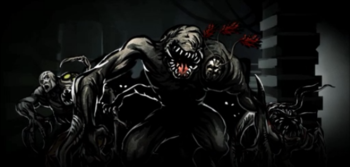 Several variations of combat form | |
| General overview | |
|
Height: |
|
|
Method of attack: |
Lunging at enemies with claws and whip-like tendrils, biting, and/or firing infectious barbs.[1][2] |
|
Notable types: |
|
The Flood combat form is the primary form used by the Flood to overwhelm and decimate surviving populations, and one of the most common forms found in early stages of a Flood outbreak. Combat forms can be created using either sapient or non-sapient hosts infected via means of the Flood Super Cell, typically by a pod infector. They serve as the Flood's primary combatants, defending the Flood against attack and securing additional hosts for infection. The most common variation of combat form is the attacker form.[1]
Pathology[edit]
Infection and creation[edit]
Combat forms are typically created when a pod infector is successfully able to enter a host's body, though this is not the only vector by which hosts can be infected.[3] Flood outbreaks can often be caused by spores or other microbiological vectors entering the host body,[3] or by contact with other forms that include Flood Seeders or Infesters.[4] In more advanced stages of infection, the need for specific infection forms is decreased as the Flood-infected area converts to a Blightland or Flood hive. By this point, the Flood presence makes up the majority of the terrain in the area, making contact with the Flood Super Cell and the naturally-generated spores an inevitability. Some Flood structures such as the "launcher" specialize in firing clouds of spores at uninfected forces, causing them to succumb to the infection without any kind of infection form involved.[5]
As Flood forms, including the combat form, naturally produce the Flood Super Cell (FSC), even being in contact with one can result in infection for an unprotected potential host. Given the combat forms' preference for melee combat, this makes even non-fatal strikes a death sentence, though such infections may progress slowly.[6] However, infection by spore inhalation or infection form is extremely quick, with a host succumbing often in as little as a few seconds.
When conventionally infected by a pod infector, the infector latches onto the host and dig into the host's flesh with a razor-sharp barb-like appendage, injecting the FSC and proceeding to burrow themselves within the host. Typically, the pod infector makes its home within the chest cavity of the host life form, though depending on circumstance this is not always the case. Depending on the host in question, the pod infector will dislodge the host's bones and organs to make room for itself, resulting in extreme disfiguration such as dislocating the host's jaw[7] or, in the case of infected Sangheili, completely snapping the neck. This process can be performed on living or recently-deceased hosts, though often results in the "death" of a living host prior to their re-animation once the FSC takes hold.[3] Some hosts may be attacked and infected by multiple pod infectors.[8] Even if the infection form is removed, the injection of FSC into the generated wounds results in those wounds becoming spore-filled blisters, and the host cannot be saved from infection.[9]
Once infected, the super cell begins to consume and convert sections of the host body, creating growths and new appendages of new super cell. As this process occurs, bodies take on the appearance and smell of decay.[8] With sapient hosts, some limbs and sensory organs are preserved in the transformation, and are used to operate tools, equipment, weapons, vehicles, and even ships.[1] Infection forms will often augment a host's body to better serve as a living weapon, and damage taken during fighting and infection can be repaired by the controlling infection form, though the combat form is ultimately disposable.[10][1] Any damage that the combat form receives ultimately creates more vectors of infection as the chunks of infected flesh it leaves behind are scattered throughout the environment.[1] The Flood Super Cell is able to arrange itself to mimic any organ needed to keep the host working,[11] while other internal organs are replaced with accretions that function as support lattices containing a sickly green liquid full of spores in suspension. Spore-filled polyps also often cover the exterior of combat forms.[1] Even once the FSC has taken control of the victim, the controlling infection form can often be seen buried within the victim, with the infection form's red sensory appendages poking out of the flesh. Until the body is completely subsumed by super cell growth, these appendages are maintained as an impromptu central nervous system.[3][1] Some combat form super cell growths take on a more chitinous nature, akin to armor plating, helping protect the combat form from enemy attacks.[12]
With sapient hosts, the victim may still attempt to cry out from what remains of its mouth and throat even while being controlled, though it is also possible for the infection form to do so using the host's thoughts and memories as a psychological weapon.[13] In extremely rare circumstances, a victim may remain fully aware of their present status, unable to do much but watch as their body is controlled by an outside force.[10][1]
Capabilities[edit]
The infection form controlling a host body does not feel pain or fear, though the host is able to feel the physical effect of attacks rendered upon it.[10] In extreme cases, the infection form will resort to self-mutilation of the host body if it needs to, such as breaking its own arms to use the snapped bone as an improvised weapon. However, the pain inflicted on the host body may also weaken the controlling infection form, provided that it was old and weak prior to infecting the host.[8] Combat forms are reliant on their infection form for all bodily and motor functions, and shooting the infection form will "kill" the combat form, though the body can be re-reanimated if another infection form is able to reach it. As a result, a combat form can be resurrected as many times as is needed, provided the body is still intact enough to be a viable host. To properly kill a combat form, it must be dismembered or disfigured to the point at which it is no longer a suitable host body for an infection form.[14]
When a sapient host is infected and made into an attacker form, the infection form is able to absorb all of the host's knowledge and memories. As a result, attacker forms are capable of operating firearms, driving vehicles, operating tools and even starships.[10] In the case of the Infinite Succor's infection, infected warriors were able to set up patrols of the ship's corridors to guard the Proto-Gravemind growing in the ship.[15] The Flood's possession of an individual's body allows it to speak with the host's tongue.[10][15][16] This memory-absorption extends critical knowledge such as command codes or colony locations. As such, when critical personnel are infected, they are contributed to the construction of a Gravemind.[17]
Attacker combat forms use their whip or scythe-like growths to attack their opponents in melee combat, and are capable of performing feats that their hosts previously could not, such as leaping large distances to cover ground. Even if a melee strike is not fatal, the imparted Flood Super Cell is enough to ensure the target's infection and death.[6] As the infection forms do not feel pain, combat forms are undeterred by enemy attacks and will not stop until they are destroyed, or their enemy is killed. Ballistic weapons are notably less effective against some combat forms because of this, with SRS99C-S2 AM sniper rifle rounds passing through combat forms with virtually no effect.[18] Targeted shots against the limbs and embedded infection form are effective ways of dispatching combat forms.[19]
Role within the Flood[edit]
Combat forms make up the majority of the Flood's combatant forces, particularly in the Feral Stage of the parasite's development in which it has yet to acquire enough raw biomass for the creation of a Gravemind or pure forms. During this stage, combat forms are not centrally controlled, and will begin to gather bodies for conversion into more Flood forms.[17] If a location cannot be immediately secured, multiple combat forms may merge to create the Juggernaut and Abomination keymind forms, able to direct local forces in the area until a permanent presence can be established.
When a local biosphere has been completely assimilated into the Flood, typically once the Flood has entered the Coordinated Stage, combat forms cannot be created anymore due to a lack of viable hosts. Due to this, the Flood moves onto breaking down raw biomass into Flood Super Cell, thereby creating pure forms of wholly Flood biomass. Once the number of pure forms reaches a sufficient equilibrium, combat forms are relegated to defensive roles or added to the hive's raw biomass and calcium reserves.[11] Otherwise, aging or damaged combat forms are turned into carrier forms, growing infection forms within a large, bulbous mass on their back.[3][2]
Types of combat forms[edit]
Virtually any creature with sufficiently complex nervous systems can be infected and made a combat form, but the most commonly-seen hosts are those of sapient species such as humans, Sangheili, and Jiralhanae.[14] Kig-Yar and Unggoy can also be made into combat forms, though are seemingly more rare.[10] Sapient hosts such as these are generally made into the most basic version of combat form, simply known as an attacker form.[1] Non-sapient animals can also be made into combat forms provided they have sufficient calcium reserves and neuro-complexity.[2]
All victims of infection via pod infector, regardless of their physiology, will undergo a similar mutation process. The skin decays rapidly, and changes to the color and texture of Flood biomass as the Flood Super Cells overtake the body. In the case of attacker combat forms, the host's arm bones elongate and grow into whip or claw-like appendages, which serve as their primary melee weapon in close-combat situations. As the pod infector now serves as the host's "brain," the head is usually forced aside, and can be severed without any effect on the combat form.[14][notes 1]
Attacker[edit]
- Main article: Flood attacker form
The most common and basic combat form is the attacker. These forms are created solely from sapient hosts bent to the Flood's will. As the parasite takes over their thoughts and memories, it uses this information to allow the attacker to use weapons, equipment, and vehicles to further the Flood's reach and overall threat level. Given the intelligence of the host, occasionally the victims can manage a whisper pleading for mercy or simply cries of pain. However, the parasite will more often speak on their behalf using their stolen thoughts to terrorize both the host and any nearby survivors.[1] Potential hosts used for attackers include humans, Sangheili, Jiralhanae, Unggoy, Kig-Yar,[10] and Forerunners.[20]
A Spartan-IV attacker form.
Thrasher[edit]
- Main article: Flood thrasher form
Thrashers are a hulking, vicious variant of combat form created through the infection of certain non-sapient animals with sufficient neuro-complexity. Limited in intellect compared to attackers, thrashers are used as simple weapons in early stages of Flood infiltration and expansion. They have whip-like barbed tentacles and toothy maws suited to gorging on the flesh that fuels their violent rampage. Bearing resemblance to some pure forms, thrashers are primarily employed to defend existing Flood hives.[2]
Several thrasher forms on Trove.
A thrasher form in the Halo Encyclopedia (2022 edition).
Swarm[edit]
- Main article: Flood swarm
Swarm forms are flying combat forms made via the infection of certain non-sapient avian predators with sufficient calcium reserves and resilient neurosystems. Despite their large size, swarm forms are remarkably swift and capable of performing coordinated attacks from the air with others of their kind. In addition to their sharp talons and teeth, swarm forms can fire infectious barbed projectiles at enemies.[2]
Production notes[edit]
Prior to the Halo Encyclopedia (2022 edition), all human, Sangheili, Jiralhanae, Kig-Yar, and Unggoy combat forms were simply referred to as combat forms. While the Encyclopedia does not dispute this, it further clarified that these kinds of Flood forms are all part of the "attacker" subset of combat forms.[1]
Notes[edit]
- ^ In Halo 3, the reanimation process can be witnessed; the host will twitch around in pain, and eventually collapse on the ground. Afterwards, the whip appendages will force itself out of the host's left arm, and the pod infector will force itself out of the host's chest.
List of appearances[edit]
- Halo: Combat Evolved (First appearance)
- Halo: The Flood
- Halo 2
- Halo Graphic Novel
- Halo 3
- Halo Wars
- Halo 3: ODST (Halo: The Master Chief Collection-only)
- Halo Legends
- Halo: Evolutions - Essential Tales of the Halo Universe
- Halo: Combat Evolved Anniversary
- Halo 4
- Halo: Spartan Assault
- Halo 2: Anniversary
- Halo: Fractures
- Halo: Tales from Slipspace
- Halo Wars 2
- Halo: Fireteam Raven
- Halo Infinite
- Halo: Saturn Devouring His Son
- Halo: Epitaph
- Halo: The Television Series Season Two
Sources[edit]
- ^ a b c d e f g h i j k l Halo Encyclopedia (2022 edition), page 408
- ^ a b c d e f Halo Encyclopedia (2022 edition), page 409
- ^ a b c d e Halo Waypoint, Flood (Retrieved on Jun 1, 2020) [archive]
- ^ Halo Wars 2: Awakening the Nightmare
- ^ Halo Wars, Flood Launcher in-game unit
- ^ a b Halo: Evolutions - The Mona Lisa
- ^ Halo 2: Anniversary, Infection game mode
- ^ a b c Halo: The Flood, chapter 10
- ^ Halo Wars 2, Phoenix Logs: Infection Forms
- ^ a b c d e f g Halo Wars 2, Phoenix Logs: Combat Forms
- ^ a b Halo 3, Bestiarum
- ^ Halo 4, Flood gametype
- ^ Halo Wars 2, Phoenix Logs: Infected
- ^ a b c Halo 3, Gameplay
- ^ a b Halo Graphic Novel: The Last Voyage of the Infinite Succor
- ^ Halo 3, campaign level The Covenant
- ^ a b Halo: Combat Evolved, campaign level Keyes
- ^ Halo: Combat Evolved, Gameplay
- ^ Halo: Official Spartan Field Manual, page 172-175
- ^ Halo: Fractures, Defender of the Storm, page 231
| |||||||||||||||||||||||||||||||||
